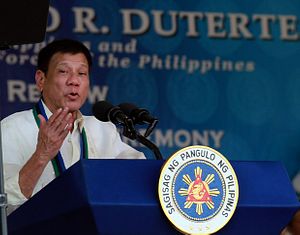If you missed it, last week, Prashanth and I discussed one of the major headlines to emerge from the week’s Asian summitry in Hanghzou and Vientiane on the podcast: Rodrigo Duterte calling Barack Obama a “son of a bitch” (or “son of a whore,” depending on who you ask), leading to a cancellation of their planned meeting. I wish we’d waited a few more days because Duterte seems to have doubled down on gestures that appear to be major setbacks for the U.S.-Philippines alliance.
Anyway, since Prashanth and I recorded the podcast, there have been a range of developments regarding the Philippines president’s rhetoric and approach toward the United States. Most significantly, Duterte, a week after insulting Obama, delivered remarks ordering U.S. special forces out of the southern Philippines where they’ve spent 15 years aiding local forces in the ongoing battle against a range of radical Muslim armed groups. Despite the president’s remarks, it appears that Manila hasn’t made a formal request to the United States on the matter yet, but the damage has been done; the remarks are just another notch on Duterte’s increasingly anti-American public posture.
Additionally on Monday, Duterte clarified that he “purposefully” did not attend the ASEAN-U.S. summit in Laos. “The reason is not I am anti-West. The reason is not I do not like the Americans. It’s simply a matter of principle for me,” Duterte said. With his remarks, Duterte, the leader of a U.S. treaty ally, had self-described as anti-American, explaining some of his broader behavior toward Obama. Making matters more complicated, a prepared set of remarks for Duterte, that went undelivered at the ASEAN Summit last week, included a passage urging respect for the rule of law in the South China Sea, including an explicit reference to the July award by a five-judge tribunal based at the Permanent Court of Arbitration that decided heavily in Manila’s favor. (Instead, Duterte spoke on human rights, lambasting U.S. atrocities in the Philippines before 1946.)
Beyond the comments on U.S. special forces and the new revelations regarding the ASEAN Summit, Duterte, on Friday, delivered remarks in Indonesia, addressing the headlines that came out ahead of the Vientiane summits. Addressing the reports on his comments toward Obama, Duterte said “I never confronted Obama here.” Demonstrating the salience of domestic politics in his rhetoric on the United States, Duterte added that “yellow allies (referencing the supporters of former President Benigno Aquino III) … were trying to crucify me for the extrajudicial killings.” Finally, he added: “We have received so many things from America. Thank you for your generosity. What they sold us, two, only two FA-50 (fighter jets). It’s FA-50 but they never gave us the missiles and the bullets and the cannons to fight.” There was just one problem with his remarks: The FA-50s in Manila’s possession came from South Korea.
And, of course, there’s more.
Adding to the week of concerning behavior, on Tuesday evening Duterte spoke to Philippines military officers in a televised address, offering what was effectively an inversion of the foreign policy program in the South China Sea championed by his predecessor. Per Bloomberg, Duterte said he was considering purchasing weapons from Russia and China and putting an end to ongoing joint patrols in the South China Sea with the United States. That’s right. Three months after a stupendously favorable legal judgement before an international court, the president of the Philippines was planning on setting aside joint patrols with its treaty ally since 1951 and purchasing weapons from the occupant of Scarborough Shoal and other disputed features inside the Philippine waters. He didn’t specify what weapons he wanted to purchase either, only setting aside the idea of acquiring more U.S. F-16s: “I don’t need jets, F-16 — that’s of no use to us … We don’t intend to fight any country.” (He’s previously criticized the Philippines’ decision to procure used F-16s.)
Understood in aggregate, Duterte’s latest spate of remarks and highly publicized falling out with Obama ahead of the Vientiane summitry suggest that challenges lie ahead for the U.S.-Philippines alliance–despite assurances that the alliance is “rock solid” from Philippines armed forces spokesman Brigadier-General Restituto Padilla. The timing, in particular, couldn’t be worse for U.S. efforts to reinforce global norms, including freedom of navigation, in the increasingly tense South China Sea. (In Tuesday’s remarks, Duterte closed the door on freedom of navigation patrols: “I just want to patrol our territorial waters.”) Duterte, as I have discussed here recently, has shown great interest in granting China its preferred mode of diplomatic interaction, pursuing bilateral talks instead of multilateralism through ASEAN. Moreover, with the Philippines taking over as ASEAN chair in 2017, it’s possible that Duterte’s lack of interest in multilateralism will deny the ten-country group the dynamic leadership it needs after a year colored by instances of fragmentation and confusion.
Duterte, despite his controversial rhetorical style, was democratically elected by the people of the Philippines and leads a fully sovereign state. However, despite his expressions of contempt and skepticism for the alliance with the United States, he has done little to offer a convincing case for why the sustenance of a close alliance with Washington harms Manila’s national interests. Amid the southern insurgencies and ongoing difficulties in the South China Sea, the United States can be an important source of ballast for the Philippines, especially given Manila’s well-known hard power deficiencies. Duterte’s predecessor understood that and, it would appear, that many within the Philippines foreign and security policy bureaucracies do as well.
Prashanth made a point on the podcast that these are still early days and it’s possible that Duterte could moderate his ways as time goes on. After all, it’s hardly been two months since his inauguration. That could well be the case. But if not, it does appear that Washington and Manila are poised for difficult times, which could be very good news for Beijing.

































